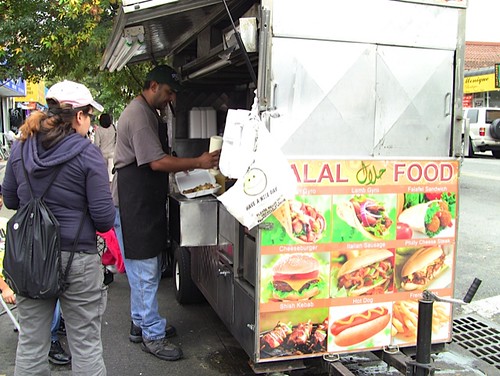
Street vendor Ahmed Foda came from his native Egypt in 2009, never expecting to work 72 hours a week at this Halal stand on 28th avenue and Steinway Street.
Ahmed Foda is an Egyptian street vendor who spends 72 hours a week working in Astoria, fighting through inclement weather while standing for 12 hours – and he does so with a smile on his face.
He is a prime example of the millions of immigrants who come to the United States in search of a better life and opportunity for their families. For many, however, those hopes and expectations are quickly shattered.
“You come to America and what you see is not what you expect, the life here is tough,” said Foda, who has been working at the Halal stand in Little Egypt for almost a year. “You feel tired of the job, you don’t want to work anymore. It’s like someone is pushing you to work, and you can’t see [them], but if you stop, you can’t eat.”
The 29-year-old Foda came to the United States with his wife Zizi in 2009. Choosing to follow his wife and her desire to make a family in the U.S., Foda left his job as an aeronautical engineer in Nasr City, Cairo.
Upon arrival, Foda expected the version of America painted by mainstream Hollywood – beautiful women, expensive cars and “happy people everywhere.” Instead he found himself struggling to make ends meet, forced to take a job at a bakery where he worked 14-hour shifts for $7.15 an hour.
“When I first started working here, the job was hard,” said Foda. “But the customers make things easy. I like my customers. When I talk to them, I feel happy. They are like my friends here because I don’t have friends.”
In 2010, approximately 83 percent of New York City’s street vendors were made up of immigrants, according to Vendors NYC. For newly arrived immigrants, working as a street vendor has its benefits – if you put enough hours and days in, you can make up to $700 a week, according to several vendors on Steinway Street. However, that wage comes with a cost: extremely long hours often set by the owners cut into family time.
Most vendors, like Foda, work six days a week. They work 10-hour shifts on average, but spend an hour before work retrieving the cart from storage and setting it up, and another hour cleaning up and storing it once again. Those two hours are not included in the amount of time it takes each vendor to get to the storage location, or from the location to his or her home.
“I know everybody has to work hard,” said Angelo Koukouva, who operates a shish kabob stand on 31st avenue and Steinway Street. “Thirty years ago, you could make money doing this. Now, I work 10 hours for $80 a day and pay my bills every month. You barely pay rent doing this.”
Koukouva, 60, came to the United States 36 years ago after his coffee shop in his native Greece went out of business. He came in search of “a job – any job that would support my family.” Today, he spends the long hours at the shish kabob stand knowing his family needs the money to survive.
Koukouva took the job at the stand three years ago after the Queens restaurant he worked at for more than 20 years closed down. Koukouva argues that because of the poor economy, many workers, including him, are forced to take jobs they would never consider under normal circumstances.
“There are a lot of people in America from Mexico, China, Africa, Cuba, Greece,” said Koukouva. “They come for jobs here and take all the jobs. What are you going to do? Are you going to leave and go [back] to Mexico or China for a job?”
For Koukouva and Foda, however – whose homelands have both recently been rocked economically and politically, respectively – returning home now is not a realistic option.
In the meantime, both men just wait for things in their new home to turn around.
“You have to forget about the hard times, because if you think about the hard times, you won’t be able to live,” added Foda. “So I smile all the time and don’t think about the bad. It’s better that way – makes things easier.”
